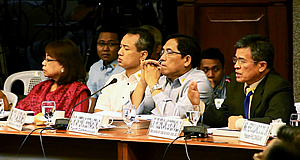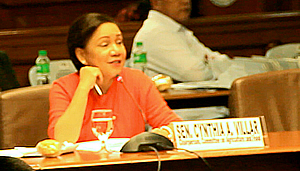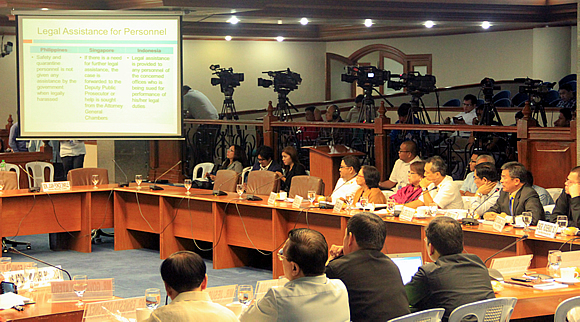 The presentation was delivered by Dr. Prudenciano U. Gordoncillo, the study team leader, on the invitation of the Committee so that it may be apprised of the findings and policy recommendations of the study, which can help in the crafting of “relevant legislation to stop rice smuggling in the country.”
The presentation was delivered by Dr. Prudenciano U. Gordoncillo, the study team leader, on the invitation of the Committee so that it may be apprised of the findings and policy recommendations of the study, which can help in the crafting of “relevant legislation to stop rice smuggling in the country.”
With Dr. Gordoncillo at the hearing were other members of the study team, namely: Dr. Cesar B. Quicoy, Prof. Julieta de los Reyes, and Dr. Arvin Vista; all are faculty members of the University of the Philippines Los Baños-College of Economics and Management (UPLB-CEM).
In the assessment of the nature of smuggling and the commodity flow of selected imported agricultural products, namely, rice, sugar, beef, onion, pork, chicken, ginger, and carrots and turnips, the data obtained were for 1986 to 2009.
Moreover, the study found that “the estimated volume of technical smuggling considerably increased after 1995. This pattern is reflected in all the eight selected commodities. Not only did the volume of technical smuggling increase considerably, but also in most of the commodities, it increased at a faster rate.”
In terms of volume (in metric tons), the top five selected agricultural commodities technically smuggled between 1986 and 2009 are milled rice, refined sugar, beef meat, dry onion, and pork, in that order. In terms of value, the top five selected agricultural commodities technically smuggled between 1986 and 2009 are milled rice, beef meat, refined sugar, pork, and chicken meat.
In his presentation, Dr. Gordoncillo noted that the Bureau of Customs (BOC) has three distinct but interrelated functions: revenue generation, trade facilitation, and safety and quarantine. The study recommends that the Philippines adopt the Singapore and Indonesia practice wherein the three functions are executed by different agencies. The study further recommends that the BOC should just be in charge of revenue generation, while the Departments of Agriculture (DA) and Health (DOH) should be in charge of safety and quarantine. Trade facilitation should be under the Department of Trade and Industry (DTI). Modifications to the boarding protocol that would allow a primary role for the quarantine and Sanitary and Phytosanitary Standards (SPS) functions of DA and DOH over the government’s revenue generation through the BOC were also recommended.
“These functions have inherent counter-checking. If you put this in one institution, counter-checking disappears. In other countries, they’re very strict, and have regular checking of accredited importers.... Safety and quarantine should be of interest. Revenue generation can come after,” Dr. Gordoncillo said.
He also emphasized the study’s recommendation to revive the procedure to have imported cargo certified by an accredited agency from the country of origin, as well as the operationalization and full implementation of the Single Window System (SWS).
Through SWS, application for import permit can be done online and can already be seen by all agencies involved in the importation process because information access is on real time. The required original documents can be sent later on to the concerned government offices. The SWS is already fully operational in all the major ports of Indonesia and this was made possible through the creation of a coordinating ministry that exercises administrative authority over all the agencies involved in the monitoring and control of the import and export procedures. Their document tracking system has greatly improved and is now less prone to tampering, and therefore, smuggling.
 Senator Villar requested Dr. Gordoncillo and his team to update the figures on volume and value of smuggling of the selected agricultural commodities to include most recent data. She said this is very important in the Committee’s policy recommendation as they are taking a closer look at the correlation between the volume and value of smuggling and that of importation.
Senator Villar requested Dr. Gordoncillo and his team to update the figures on volume and value of smuggling of the selected agricultural commodities to include most recent data. She said this is very important in the Committee’s policy recommendation as they are taking a closer look at the correlation between the volume and value of smuggling and that of importation.
Dr. Gordoncillo said it would be possible to provide the updated figures up to 2012 and submit the document after a week.
The Fifth Public Hearing was conducted pursuant to the “progress and issues on the implementation of recommendations of the Committee on Agriculture and Food in the Fifteenth Congress under Committee Report No. 763 (Rice Smuggling at the Subic Bay Free Port Zone and Port of Legazpi, Albay and the NFA-Private Sector Financed Importation Program)” and two Philippine Senate Resolutions. In the hearing, the Committee delved into the National Food Authority (NFA) and BOC regulations on rice importation, the eventual removal of quantitative restrictions on rice, the possible amendments of laws pertaining to the rice industry, as well as policies and possible legislations to ensure the stable supply and price of rice.
A SEARCA delegation led by Dr. Maria Celeste H. Cadiz, Program Head for Knowledge Management, also attended the public hearing. With Dr. Cadiz were Ms. Nancy L. de Leon, Program Specialist for Project Development and Management; Mr. Henry M. Custodio, Program Specialist for Research and Development; and Ms. Leah Lyn D. Domingo, Public Relations Specialist.
